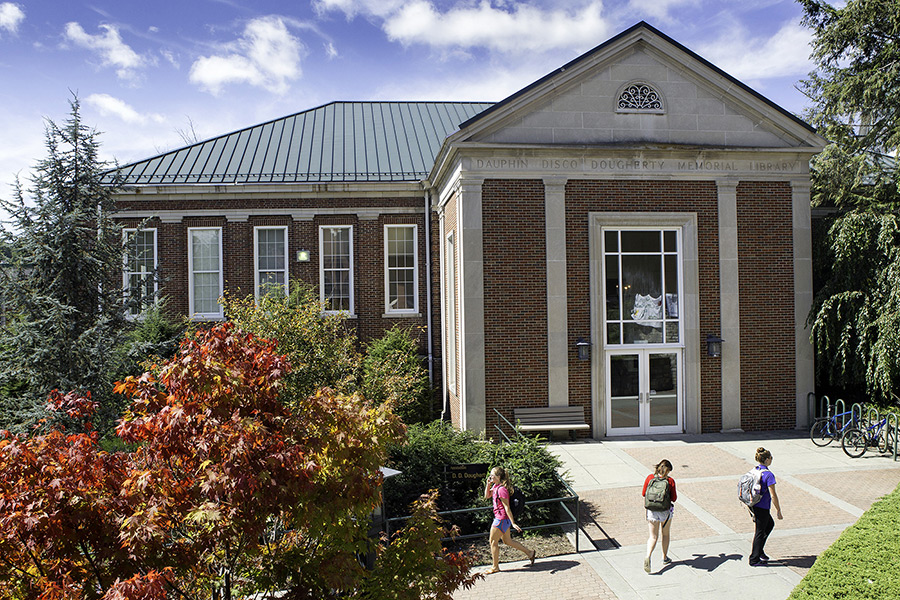
Located in D.D Dougherty Hall, the federally funded Student Support Services (SSS) Program provides comprehensive services to low-income and/or first generation college students. Through its services the program provides opportunities for academic development, assists students with college requirements and serves to motivate students toward the successful completion of their postsecondary education. (Photo by Marie Freeman)
BOONE—For the past 43 years, Appalachian State University has been part of the federally funded Student Support Services Program (SSS) designed to help increase the number of low-income college students, first-generation students and those with disabilities successfully complete a postsecondary education.
The program’s most recent U.S. Department of Education award totals $1.5 million over the next five years.
Housed in the Learning Assistance Program on campus, Appalachian’s Student Support Services Program serves approximately 200 students annually.
The program’s success rate is impressive. According to Director Cathia Silver, the program had a 91 percent retention rate for all students from 2013-14. The five-year graduation rate for the 2008 class was 67 percent. Forty-eight percent of the program’s current freshmen are from diverse populations. First- and second-year students receive some financial support from the federal funds.
The close personal attention the program provides contributes to the students’ success.
“We advise students from their first days on campus during orientation through graduation,” Silver said. “We offer mentoring support, academic workshops, study halls, our own First Year Seminar course, a first year writing course, college success seminars, early advising and course preregistration. We average 4,000 individual contacts with students a year.”
The program has three full-time advisors: Silver, Christine Davé and Janet Beck, who teaches the First Year Seminar and first year writing course. In addition, four graduate students work as mentors and a graduate assistant works with the First Year Seminar and writing courses.
The program further engages students in campus life through various community service opportunities, according to Davé, associate program director. “We tell students that part of their role is being a member of the community and contributing to it,” she said. Students also attend cultural events together, which further builds a sense of community. Freshmen are required to meet with their graduate student mentor once a week. “We are their support system, their home, while they are here,” she said.
Jose Montoya, a 2014 psychology graduate, called the program a “blessing for a lot of people that allows them to succeed and get the resources that they need.”
Now a graduate student in UNC Charlotte’s Master of Social Work program, Montoya immigrated to the U.S. with his parents when he was 3. He first learned about options for higher education through Appalachian’s Upward Bound Program for high school students when he was in public school in Ashe County. He said the experience “opened my mind to new ideas.”
While at Appalachian, he realized how privileged he was to have access to the Student Support Services Program, including almost unlimited access to his advisors and the support of a mentor.
“Having a mentor helped me realize if I wanted to go to graduate school I needed to focus on my grades,” he said. Montoya earned his degree in four years.
His goals include working in a clinical mental health setting following graduate school and eventually working as a school social worker helping other low income, first-generation college students succeed.
Jackie Hellwege was a first-generation college student when she enrolled at Appalachian. Homeschooled from 6th to 12th grade, she said Student Support Services provided the “support network that was integral in helping me navigate and maneuver through the university, and were always there to keep me on track” with academics and career plans.
During a sophomore biology class at Appalachian, Hellwege realized that she enjoyed the “puzzle of genetics” and wanted to pursue an advanced degree.
After earning a degree in pre-professional biology in 2009, she entered the Ph.D. program in molecular genetics and genomics at Wake Forest University, graduating in 2014. She currently is a research fellow at Vanderbilt University Medical Center. Her work in genetic epidemiology involves the interplay between genetic variations and human disease, and genetics and the environment.
SSS students at Appalachian regularly earn chancellor’s list and dean’s list honors. “This shows that with the development of their self-motivation, personal dreams and goals, and by taking advantage of all the support offered, they can succeed academically,” Davé said.
“Every student has the right to an equal opportunity to learn and succeed in college,” U.S. Secretary of Education Arne Duncan said. “These grants provide critical support to students who can benefit from extra help and encouragement along their college journey, enabling them to reach their personal goals and contribute to the economic vitality of our nation.”
To learn more about Appalachian’s Student Support Services Program, visit http://lap.appstate.edu/student-support-services.
About Appalachian State University
As a premier public institution, Appalachian State University prepares students to lead purposeful lives. App State is one of 17 campuses in the University of North Carolina System, with a national reputation for innovative teaching and opening access to a high-quality, cost-effective education. The university enrolls more than 21,000 students, has a low student-to-faculty ratio and offers more than 150 undergraduate and 80 graduate majors at its Boone and Hickory campuses and through App State Online. Learn more at https://www.appstate.edu.
What do you think?
Share your feedback on this story.











